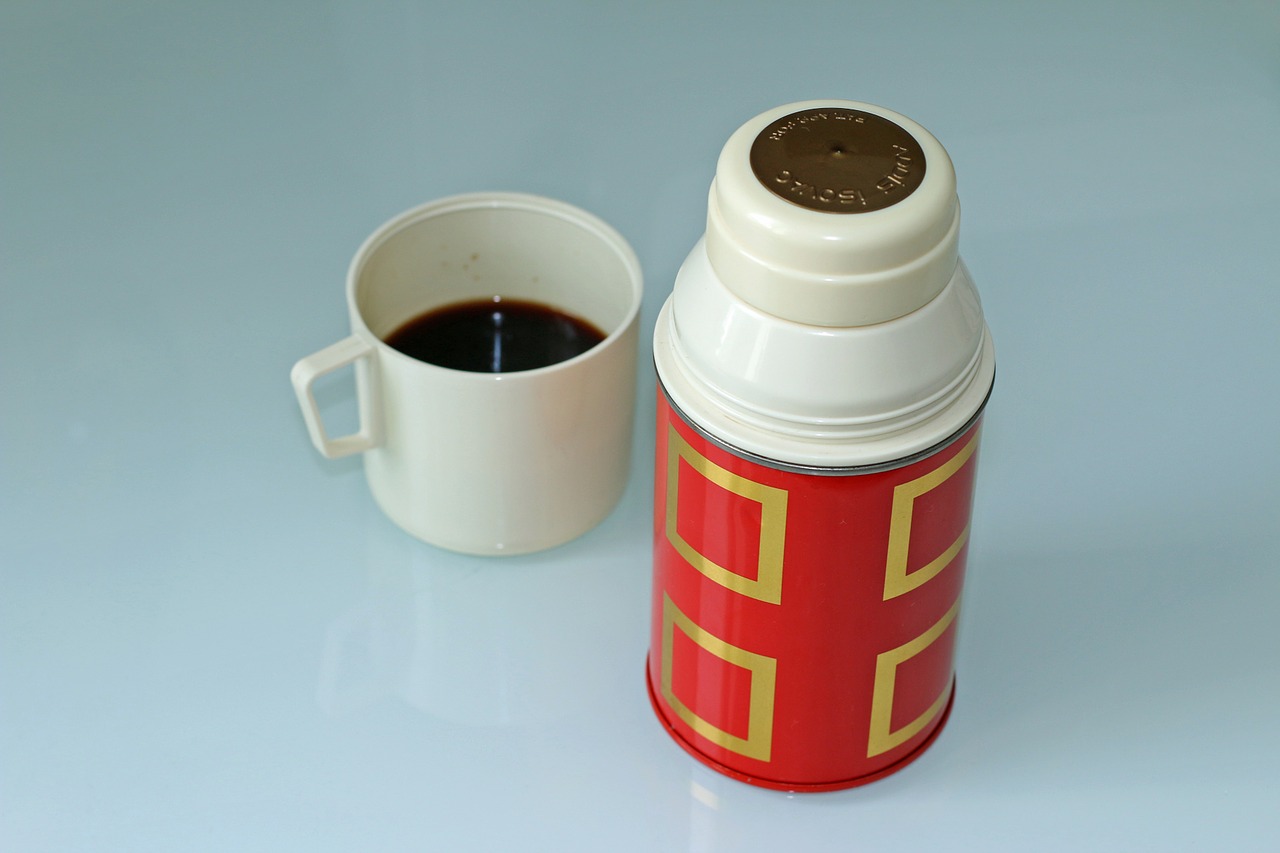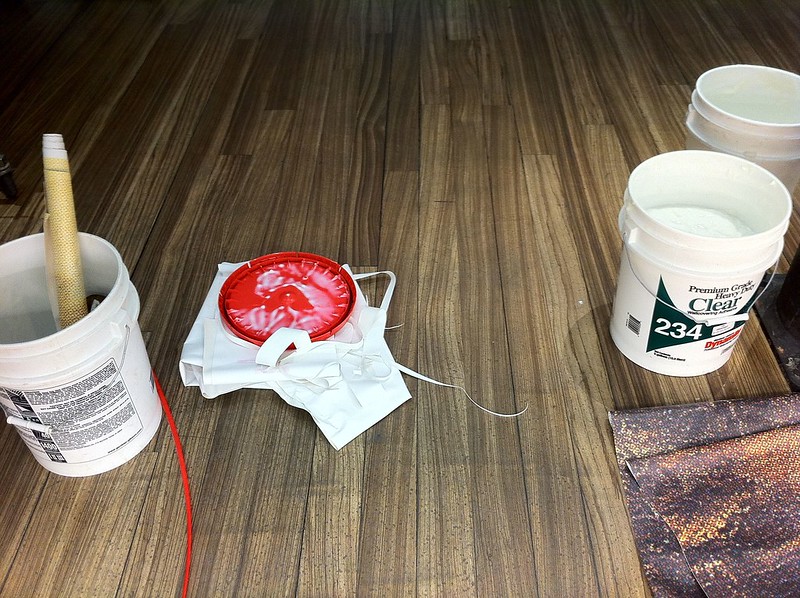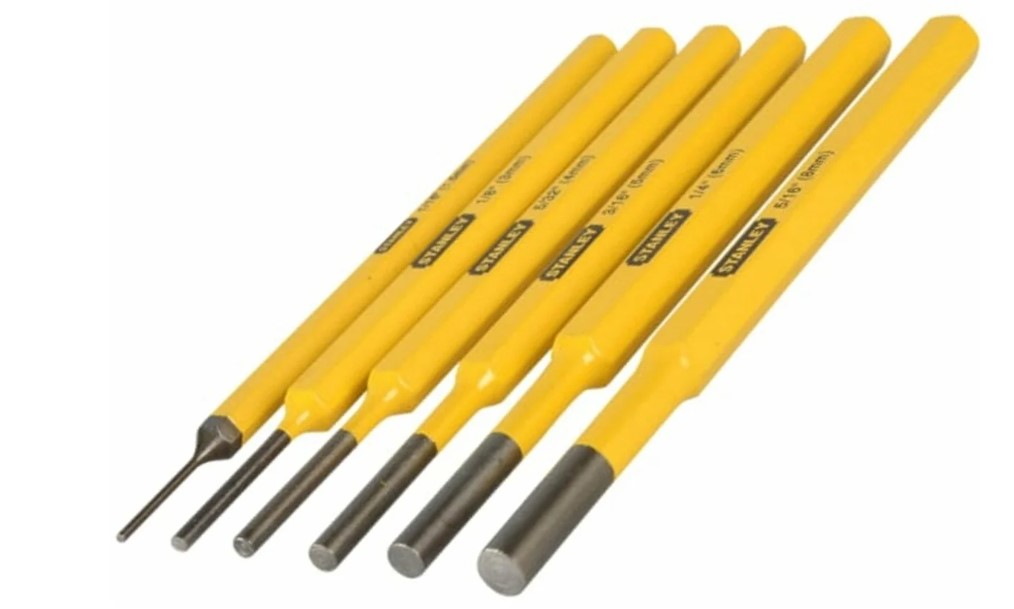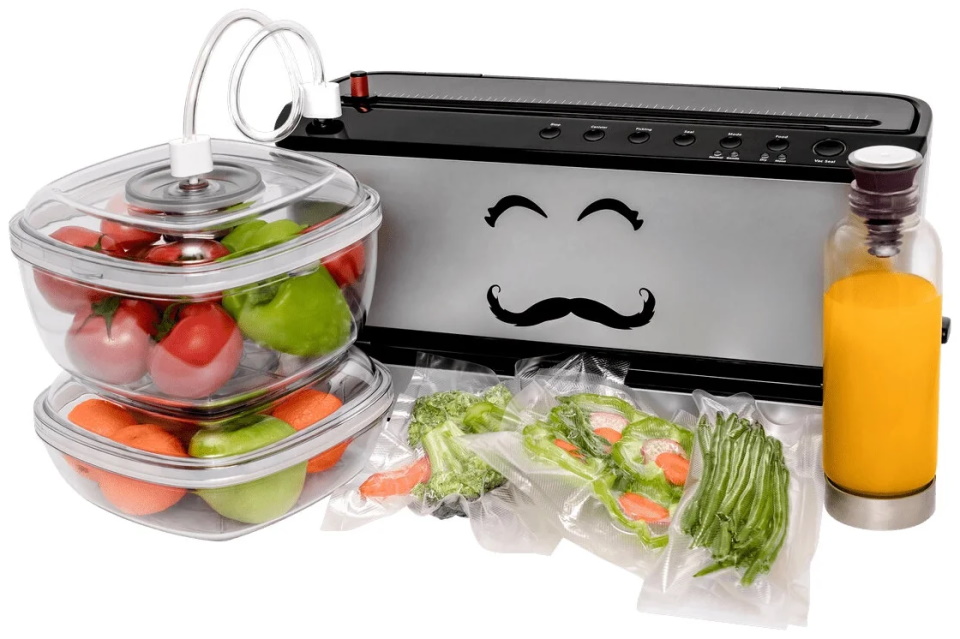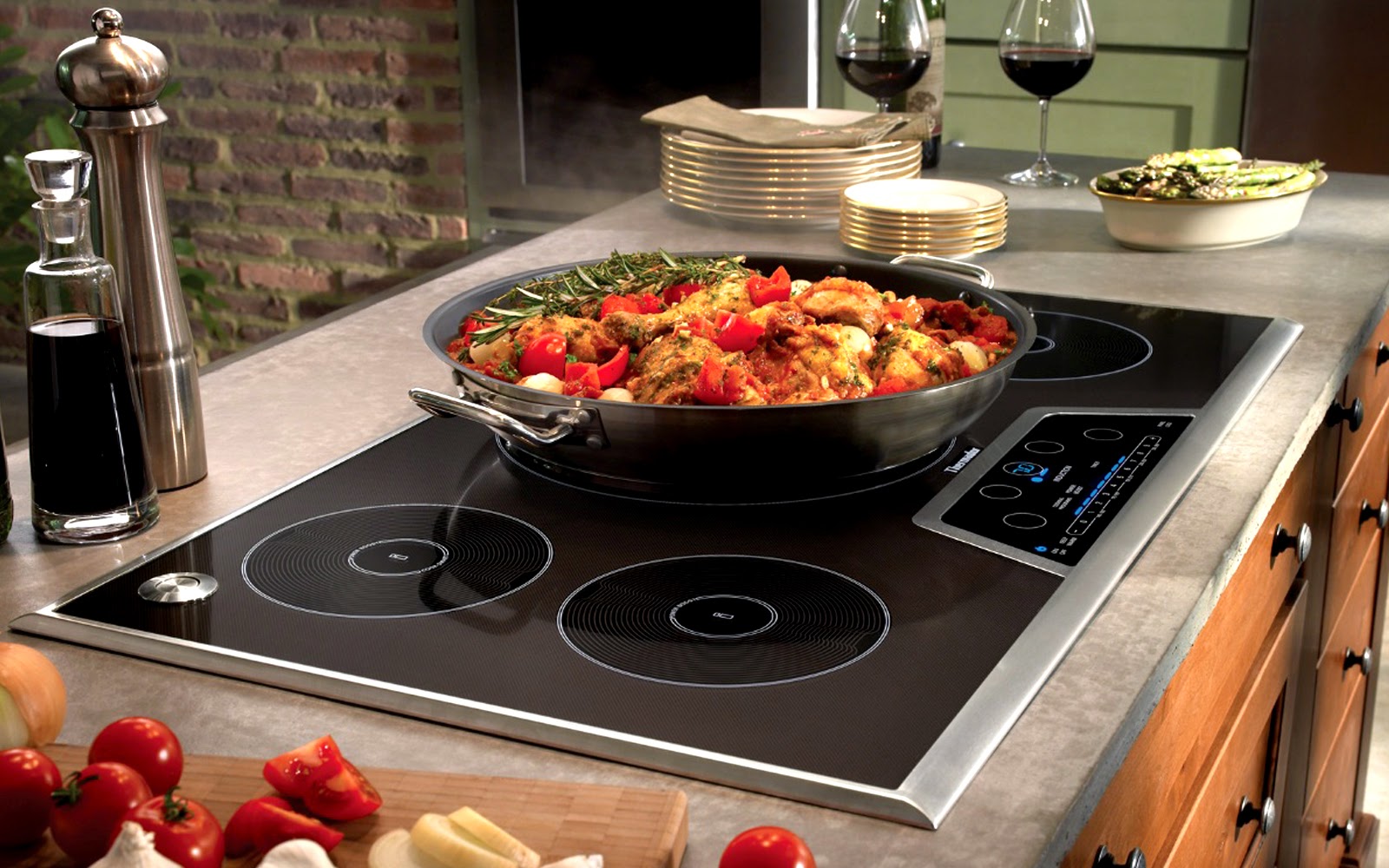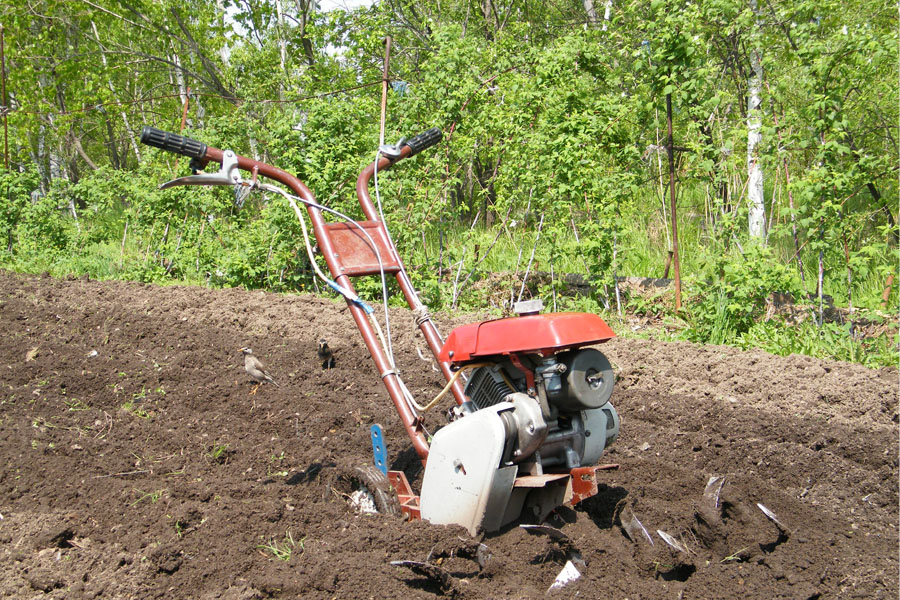Rating of the best anti-scale products for 2022
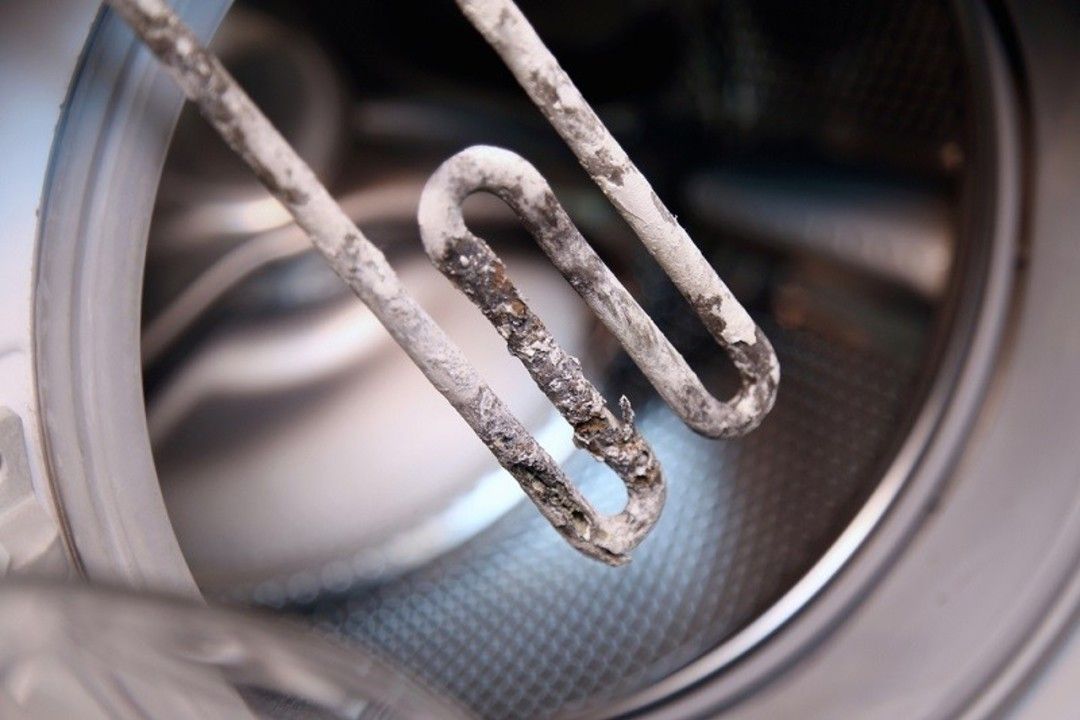
Scum is an actual problem that everyone has encountered. If once it could be seen only in teapots and pots, now this unpleasant question has touched all electrical appliances with water heaters. These are electric kettles, irons, coffee makers and coffee machines, washing machines and dishwashers, steamers. All of them require regular maintenance. After all, the lack of timely descaling can lead to burnout of the heating element, and consequently, the device as a whole. Fortunately, manufacturers of household chemicals did not leave us alone with this problem and offered a huge amount of products to remove scale and limescale. Let's try to understand all this diversity and highlight the best means in the fight against scale.
Content
- 1 What is scale and why is it terrible
- 2 Ways to deal with scale
- 3 Features of special anti-scale products
- 4 The best remedies for scale
What is scale and why is it terrible
Before dealing with scale, let's figure out what it is and how it is formed.
As you know, tap water contains a certain amount of salts dissolved in it. Most often, these are carbonate salts of calcium and magnesium. The hardness of water depends on their quantity. Accordingly, the more these salts are dissolved in water, the harder it is. It is the hardness of the water that determines the rate of scale formation in water heaters. When water is heated, the salts break down into carbon dioxide and a solid precipitate, which settles on the surface of an electric heater (or on the walls of an ordinary kettle). This sediment is scum.
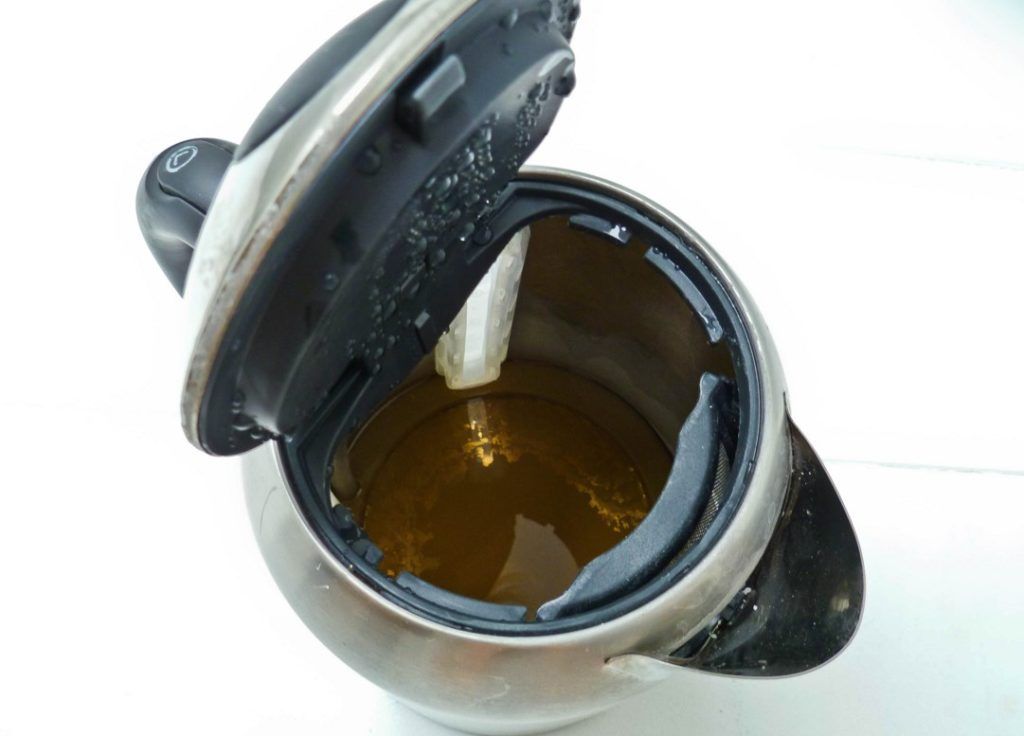
At first glance, the harm caused by scale is only aesthetic in nature. But this is far from true. The layer of solid sediment reduces the ability of the metal from which the heater is made to conduct heat. Therefore, due to the thermal insulation that has appeared, the heating element is forced to increase its temperature in order to heat the water.Based on the laws of physics, the resistance of the conductor increases with increasing temperature, and the power decreases. A decrease in power leads to an increase in the time for heating water. In simple words, a kettle with scale will heat water longer than without it. In addition, the scale layer can cause significant overheating of the heating device, which leads to its burnout and failure (typical for washing machines and dishwashers).
Ways to deal with scale
As it became clear from the above, solid deposits on the bottom of kettles and heating elements must be fought. There are several ways:
- reduction of water hardness;
- technological;
- chemical.
Reducing the hardness, or softening, of water is carried out using special filters or magnetic converters that are installed on the water supply line.
A technological method for preventing and preventing the appearance of scale is being developed by manufacturers of household appliances (for example, self-cleaning systems in irons). But embedded systems do not always cope with hard water, which requires the use of a third method - chemical.
The chemical method implies the treatment of the surfaces of the heating elements with acid-containing agents. This method of dealing with lime deposits is the most common at home. It is effective, but has its own characteristics depending on the form and composition of the means used.
Separately, it is worth highlighting folk ways to deal with scale. Many people are suspicious of store-bought "chemical" detergents and cleaners and prefer to use natural "natural" cleaners. In the fight against scale, two products are most often used:
- lemon acid;
- table vinegar.
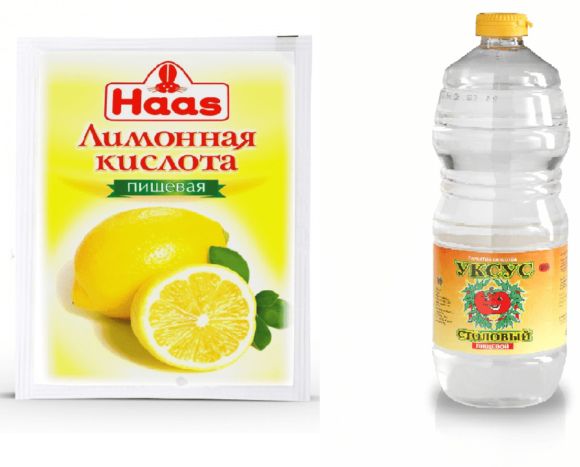
We will not hide this, they really remove scale and are quite effective, because they are acids. But there is one small but significant nuance. Both citric and acetic acids without softening additives aggressively affect plastic, rubber and metal, including parts of electrical appliances, which, if used frequently, can lead to equipment breakdown. In addition, we cannot independently calculate the required concentration of these funds for various situations. And the dosage at random will only lead to high costs for the repair of electrical appliances.
Features of special anti-scale products
A wide range of anti-scale chemicals provoked a logical question, which one to choose? All special products of this nature contain an acid, which, reacting with a solid lime precipitate, dissolves it. Manufacturers of products most often use citric, raspberry, malic, lactic, sulfamic and other acids as an active ingredient. It is important to remember that acid in high concentration can damage the rubber and plastic parts of the devices. Therefore, it is important to follow the instructions for using the products on a particular water heater.
Often, manufacturers of household appliances produce related care products (typical for manufacturers of coffee machines). They use components that gently remove scale without harming the details of the devices. This is not to say that an all-purpose descaling agent will not cope with plaque, but it may be more aggressive to the materials from which the internal parts of the devices are made.At the same time, the exact dosage for a particular device is not always indicated on universal products.
Funds are most often produced in three forms: liquid, powder and tablets, but, as verified by experience, this does not affect their effectiveness in any way. If liquid and gel products are already ready for use, then powder and tablet products still need to be dissolved in water. Consider the best, according to users, descalers in 2022.
The best remedies for scale
Kettle descaling products
top house
Liquid product based on 5% organic acid. Made in Germany. The manufacturer guarantees successful removal of limescale in combination with respect for the internal parts of water heaters.
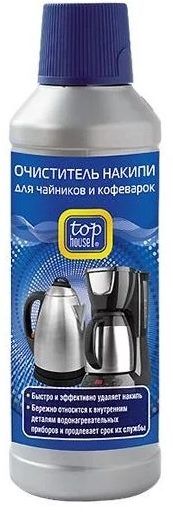
Volume: 500 ml. Cost: from 260 rubles.
- suitable for coffee makers;
- has no smell.
- enough for only two uses.
Topperr 3031
Concentrated descaler for kettles and other water heaters. The German-made product meets the declared characteristics, quickly and effectively cleaning the walls of the kettle from limescale. For one cleaning, it is recommended to use 100 ml of the composition.
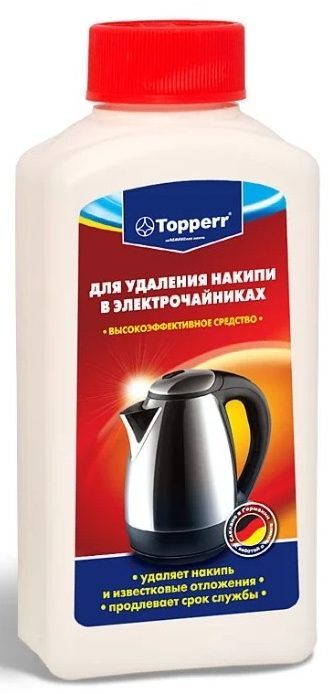
Volume: 250 ml. Cost: from 139 rubles.
- no unpleasant odor;
- suitable for various heating electrical appliances;
- provide protection for a certain period from the subsequent formation of plaque.
- high consumption (the bottle is enough for two uses).
SANO Antikalk Kettle Descaler
The product is available in the form of a gel. It is intended for removal of limy deposits in teapots and coffee makers.At the same time, it can be used to clean plaque on sanitary equipment, ceramic tiles, plastic and glass products. It is produced on the basis of phosphoric and sulfamic acids.
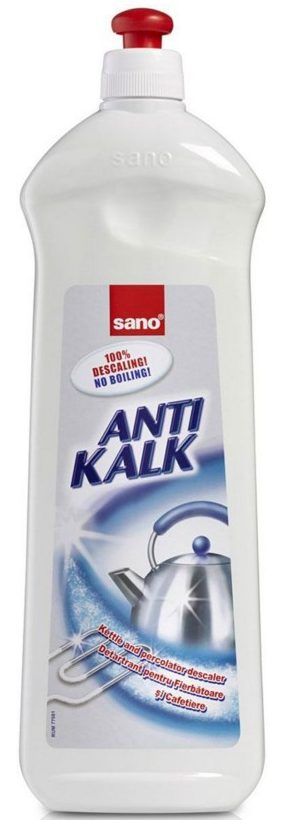
Volume: 700 ml. Cost: from 350 rubles.
- instantly removes scale;
- multifunctional;
- large volume of the bottle;
- economical consumption.
- not found.
Descalers for coffee machines
Means for coffee machines should be allocated especially. They remove not only lime deposits, but also coffee and essential oils, which gradually accumulate during continuous coffee preparation. At the same time, they do not leave any smell or film on the walls of the coffee machine, which could affect the taste or aroma of coffee.
Philips Saeco CA6700/10
Liquid product based on lactic acid, released to remove scale in coffee machines from the manufacturer. Suitable for coffee makers and coffee machines from other manufacturers.
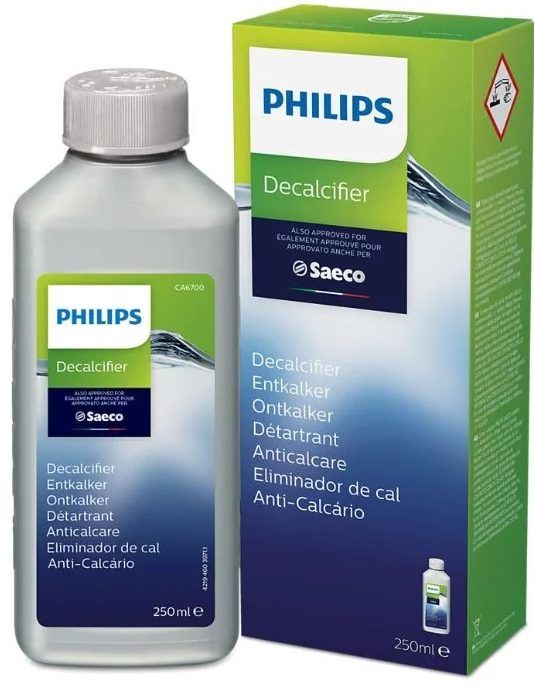
Volume: 250 ml. Cost: from 750 rubles.
- gently and effectively removes limescale deposits from Philips coffee machines, thereby extending their life.
- expensive compared to similar branded products;
- enough for just one cleaning.
Bosch Descaling
Descaling agent manufactured by Bosch. Available in the form of tablets for the preparation of a cleaning solution. The active ingredients are citric, malic, sulfamic acids. The package contains 6 tablets, which is enough for 3 cleanings.
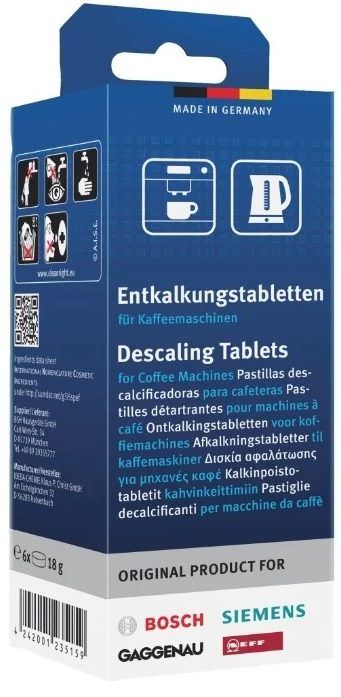
Cost: from 530 rubles.
- can be used for teapots;
- effectively remove solid deposits without subsequently affecting the taste of the drink.
- not found.
Melitta Anti Calc
An effective and safe product based on citric acid. Available as a concentrated liquid. Suitable for drip coffee makers. Gently, without damaging the internal parts of the device, cleans the system from plaque.
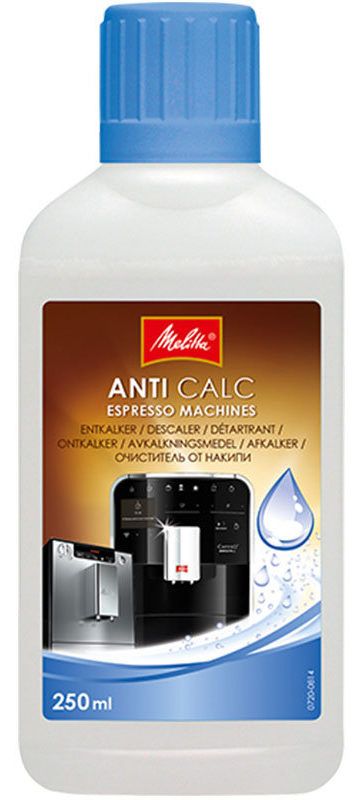
Volume: 250 ml. Cost: from 285 rubles.
- has no smell;
- non toxic.
- Only suitable for coffee makers and kettles.
Topperr 3006
Concentrated descaler for coffee machines. Available in liquid form. The main active ingredient is sulfamic acid. In addition, the product contains no more than 5% non-anionic surfactants. Effectively cleans kettles and coffee makers from lime deposits without damaging the internal parts of the appliances.
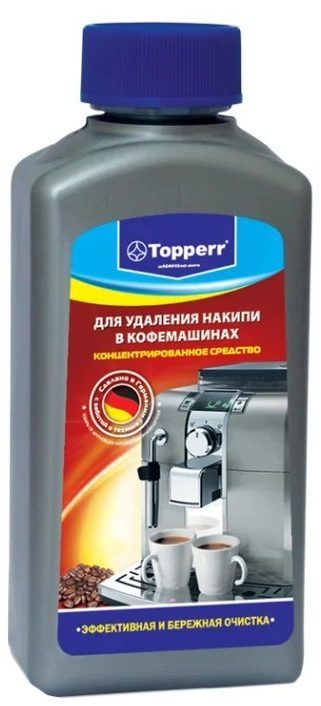
Volume: 250 ml. Cost: from 169 rubles.
- removes scale and prevents its further appearance;
- much cheaper than original products.
- for cleaning coffee machines enough for two uses;
- not suitable for all coffee makers.
Iron limescale remover
MAGIC POWER
The agent is a clear liquid with a perceptible soapy-sour odor. Made in Germany. The composition includes citric acid, softened by non-anionic surfactants, excipients.
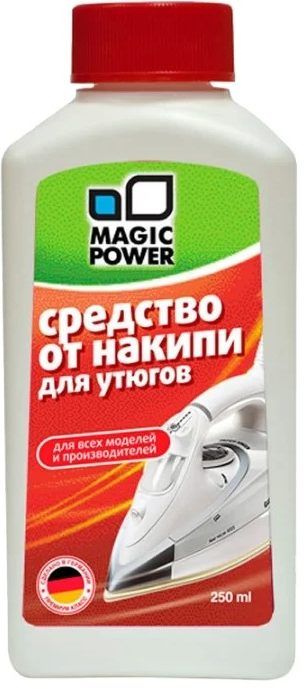
Volume: 250 ml. Cost: from 84 rubles.
- completely removes limescale deposits in the iron.
- unpleasant "chemical" smell when cleaning the iron.
Descalers for washing machines and dishwashers
clean home
Russian-made liquid agent, which includes citric acid, lactic acid, polycarboxylates and other functional additives.According to the manufacturer, it not only effectively copes with scale in the washing machine and dishwasher, but is an environmentally friendly product.
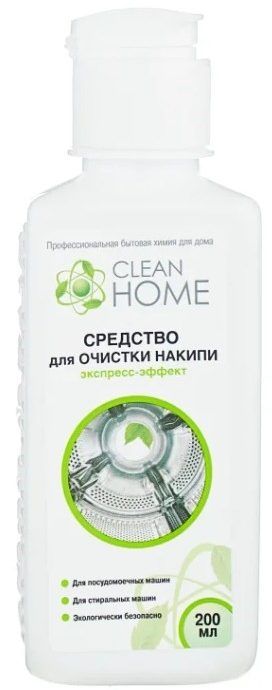
Volume: 200 ml. Cost: from 122 rubles.
- not only cleans, but eliminates unpleasant odors;
- does not contain synthetic dyes, fragrances;
- does not leave behind pungent odors and plaque, it is easily washed out with water.
- only enough for one application.
filtero
Powdered product based on citric acid. It is used for cleaning from plaque in washing machines and dishwashers.
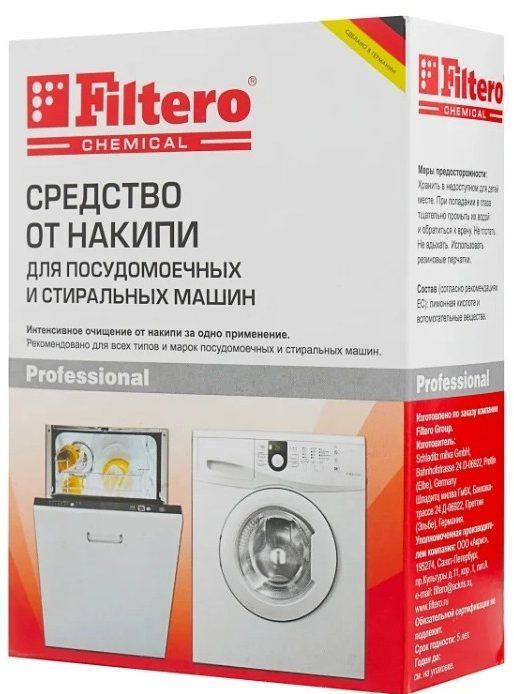
Weight: 200 gr. Cost: from 180 rubles.
- removes scale from the first time.
- the composition does not indicate which excipients soften the effect of citric acid;
- The packaging is enough for one time for a washing machine or twice for a dishwasher.
Topperr
Express cleaner based on anhydrous citric acid. Acid sulfite softens the action of citric acid and protects rubber and plastic parts of machines. Made in Italy.
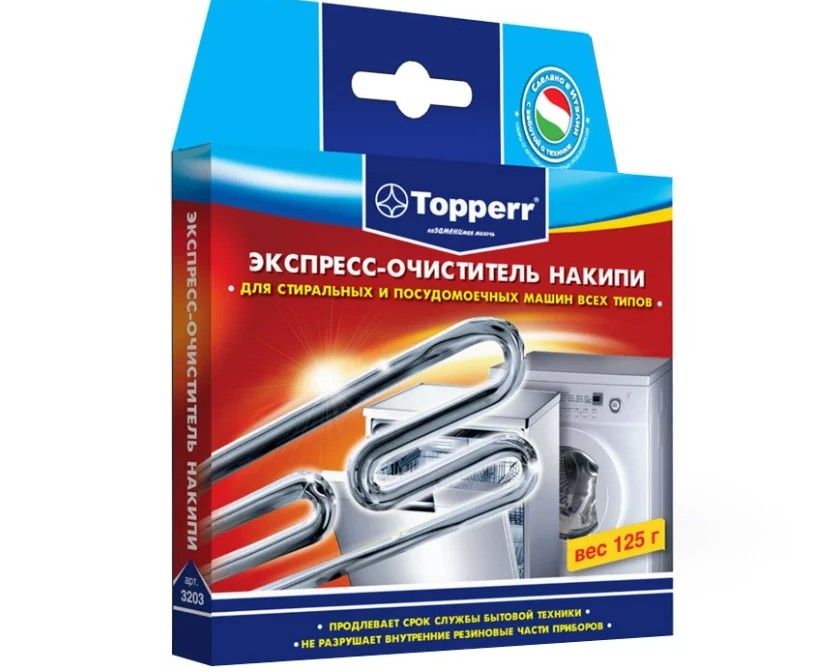
Weight: 125 gr. Cost: from 180 rubles.
- effectively removes not old scale.
- does not cope with scale the first time and requires re-application;
- packaging for one use.
Electrolux Descaler
Powdered product based on citric acid. Additional components that make up the powder protect the rubber and plastic parts of the devices from the aggressive effects of acid. Made in Italy.
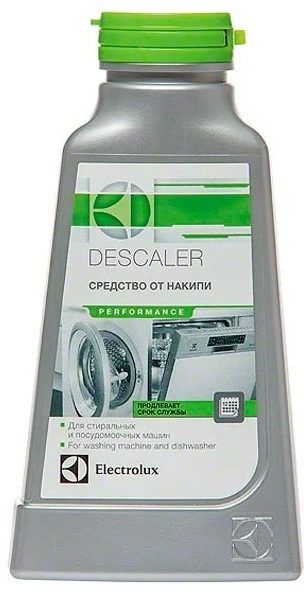
Volume: 200 ml. Cost: 470 rubles.
- removes scale from the first application;
- has no smell.
- not found.
The best all-round descaling products
Cinderella "Antinakipin"
Liquid product of a domestic manufacturer, based on organic and mineral acids. Copes with scale and lime deposits in kettles, irons, washing machines. Not suitable for use in enamelware.
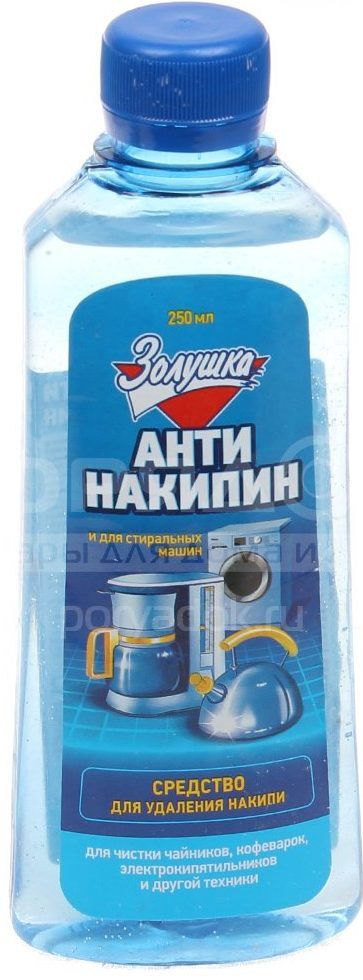
Volume: 250 ml. Cost: from 23 rubles.
- quickly and efficiently cope with the tasks;
- low cost.
- not found.
AEON
Russian-made universal powder product for removing scale and salt deposits. The composition of the powder includes organic food acids, sodium hexametaphosphate (food additive, water softener) and food mixtures of salts.
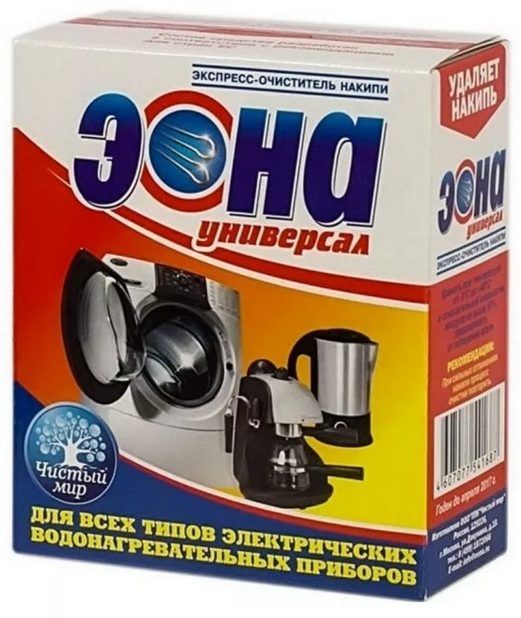
Weight: 250 or 300 gr. Cost: from 95 rubles.
- effectively;
- without smell.
- not found.
Etamine du Lys
A universal remedy for scale and limescale, 99% composed of natural ingredients. The product is made in France and is completely ecological. It can be used on various surfaces, as well as for cleaning plaque in washing machines and dishwashers. Release form - liquid in a spray bottle. To use, it is enough to spray on the inner surface of the device and wait for a while, and then rinse with water.
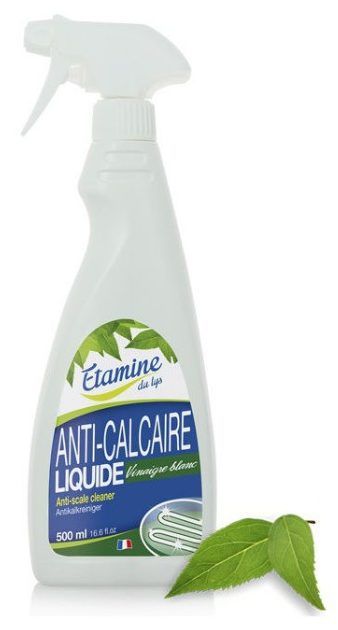
Volume: 500 ml. Cost: from 588 rubles.
- natural remedy;
- ease of use.
- strong smell of vinegar;
- with a strong plaque, the procedure must be repeated several times.
HG
A concentrated liquid product made in the Netherlands.The manufacturer guarantees quick descaling without damaging the internal parts of water heaters.

Volume: 500 ml. Cost: from 500 rubles.
- economical consumption: enough for up to 10 applications;
- leaves no odor.
- not suitable for espresso machines and irons.
In conclusion, I would like to say that, ideally, use products recommended or produced by the manufacturer of this type of household appliances. If there are no specific recommendations or for some reason it is not possible to purchase a branded product, then it is important to take a responsible approach to choosing an analogue. In this case, you should pay attention to two important points: safety for the body and the absence of aggressive components in the composition that can damage the rubber or plastic parts of the devices. It is also important that the product has no smell, especially for teapots, coffee makers and coffee machines. In addition, caution should be used with universal means. Although they are effective, they affect different devices in completely different ways. There is no one-size-fits-all remedy. When choosing it, it is worth considering the degree of water hardness and its salt composition (if possible, make an appropriate analysis), the frequency of operation of electrical appliances. Only with an integrated approach to this problem will it be possible to solve it for a long time.
new entries
Categories
Useful
Popular Articles
-

Top ranking of the best and cheapest scooters up to 50cc in 2022
Views: 131662 -

Rating of the best soundproofing materials for an apartment in 2022
Views: 127700 -

Rating of cheap analogues of expensive medicines for flu and colds for 2022
Views: 124527 -

The best men's sneakers in 2022
Views: 124044 -

The Best Complex Vitamins in 2022
Views: 121948 -

Top ranking of the best smartwatches 2022 - price-quality ratio
Views: 114985 -

The best paint for gray hair - top rating 2022
Views: 113403 -

Ranking of the best wood paints for interior work in 2022
Views: 110329 -

Rating of the best spinning reels in 2022
Views: 105336 -

Ranking of the best sex dolls for men for 2022
Views: 104376 -

Ranking of the best action cameras from China in 2022
Views: 102224 -

The most effective calcium preparations for adults and children in 2022
Views: 102019
